In the shadow of Mount Blanc, nestled within the dense forests of Morocco, lies a hidden world where migrants from various corners of the globe endure unimaginable hardships in search of a better life. Away from the bustling cities and tourist destinations, these forests provide shelter, albeit temporary and precarious, for those who have embarked on perilous journeys in pursuit of hope and opportunity.
The circumstances that drive individuals to seek refuge in these forests are as diverse as the people themselves. Economic instability, political unrest, persecution, and environmental disasters are just a few of the myriad reasons that force individuals to leave their homes and embark on treacherous journeys. Fleeing conflict zones or impoverished regions, they set their sights on Europe, often viewing it as a promised land where they can rebuild their lives.
However, the reality they encounter is far harsher than they could have imagined. Many migrants find themselves stranded in Morocco, unable to continue their journey into Europe due to tightened border controls and increased surveillance. Caught in limbo, they are left with few options and even fewer resources.
For these migrants, the forests near Mount Blanc become both sanctuary and prison. Far from the prying eyes of authorities, they carve out makeshift shelters from branches and leaves, surviving on whatever scraps of food they can scavenge or beg for. Nights are spent huddled together for warmth, surrounded by the eerie silence of the wilderness.
Living conditions in these forest encampments are dire, to say the least. Lack of access to clean water, sanitation facilities, and medical care poses serious health risks. Malnutrition and disease are rampant, exacerbated by the harsh living conditions and limited resources.
Yet, amidst the despair, there is resilience and solidarity. Migrants band together, forming tight-knit communities bound by a common struggle. They share what little they have, offering support and comfort to one another in the face of adversity. In the absence of official aid, they rely on grassroots organizations and humanitarian volunteers who provide essential supplies and assistance.
Despite their resilience, the future remains uncertain for these migrants. As they wait in limbo, their dreams of reaching Europe become increasingly distant. The forests that once offered refuge now seem like a prison, trapping them in a cycle of uncertainty and desperation.
Many migrants opt to traverse the heavily fortified borders between Morocco and Ceuta, risking their lives in the process. The barriers erected by Spanish authorities include high fences topped with barbed wire, surveillance cameras, and security forces patrolling the area. Despite these deterrents, migrants desperate for a chance at a better future often resort to risky tactics, such as scaling the fences or swimming through the sea, in a bid to enter Ceuta undetected.
The dangers associated with attempting to cross into Ceuta are manifold. The journey is fraught with physical hazards, including the risk of injury from climbing fences or drowning while attempting to swim across the sea. Moreover, migrants face the constant threat of detection by border security forces, who are authorized to use force to prevent unauthorized entry into the enclave.
Tragically, clashes between migrants and security forces have resulted in fatalities. Reports of violence and brutality perpetrated by border security forces have raised concerns about human rights abuses and excessive use of force. In some instances, migrants have been subjected to beatings, arbitrary arrests, and even lethal force, prompting outcry from humanitarian organizations and advocacy groups.
The exact number of deaths at the borders between Morocco and Ceuta is difficult to ascertain, as many incidents go unreported or undocumented. However, numerous reports and eyewitness accounts suggest that fatalities are not uncommon, with migrants falling victim to the harsh realities of border enforcement measures.
As the world grapples with the ongoing refugee crisis, we mustn’t turn a blind eye to the suffering of those who have been forced to flee their homes. We must strive to address the root causes of migration and work towards creating a more just and equitable world where all people can live with dignity and opportunity. Until then, the forests near Mount Blanc will continue to bear witness to the hidden struggles of those who have been left behind.

